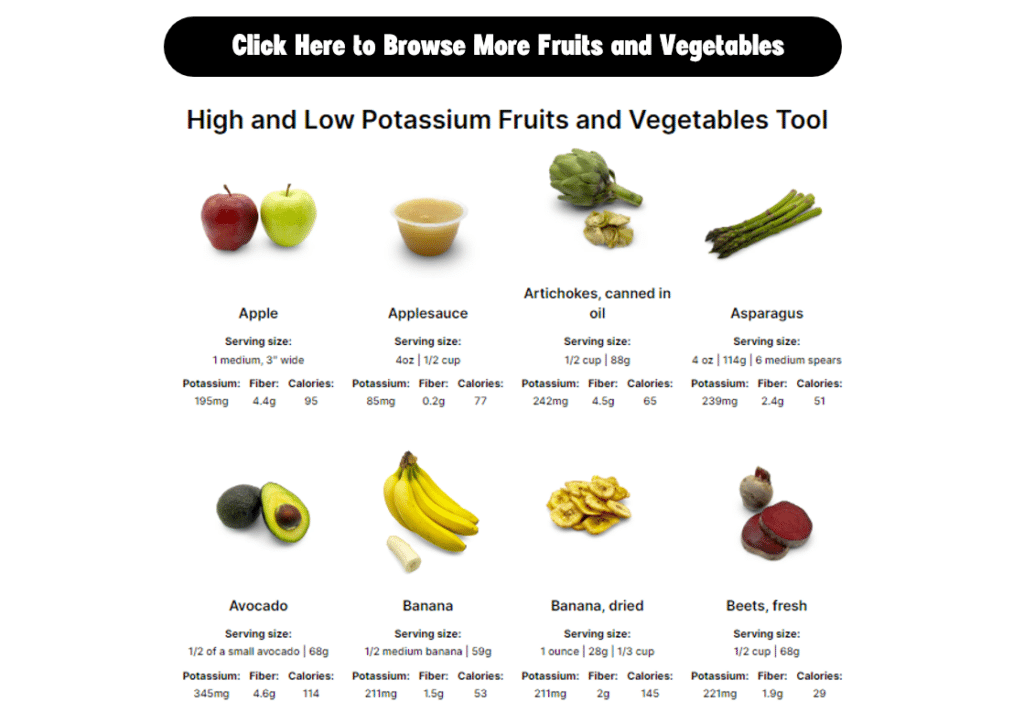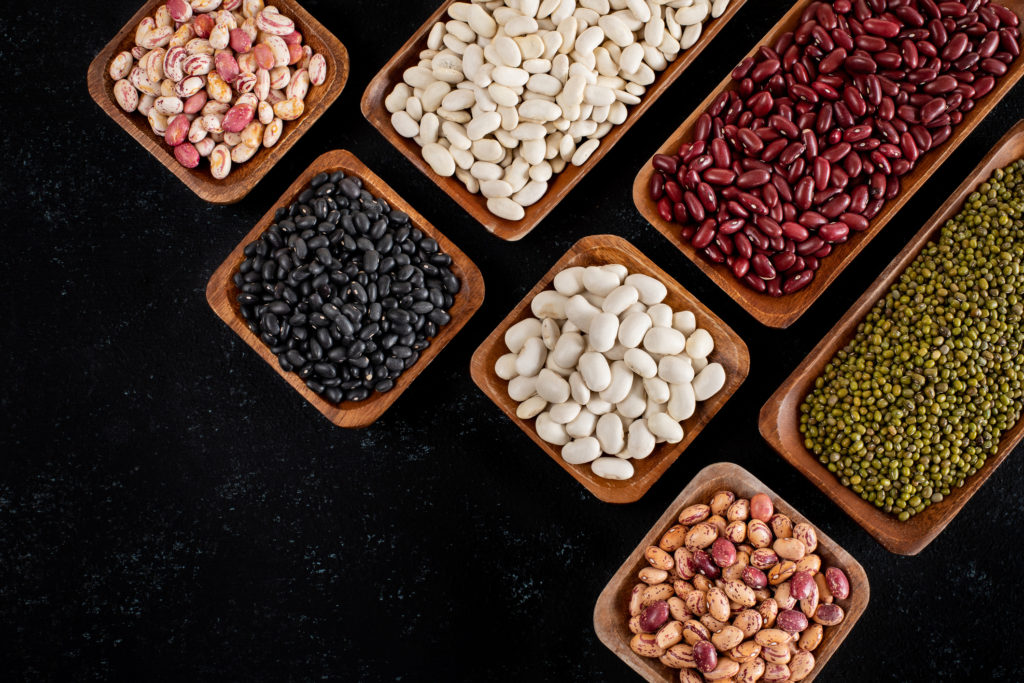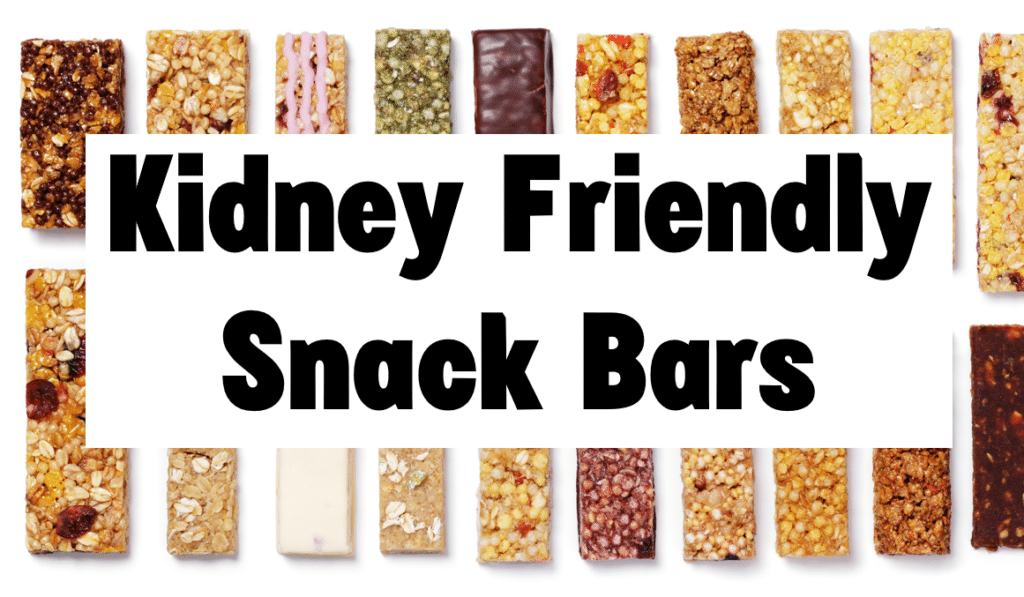Table of Contents
Are Bananas good for kidneys?
Yes, bananas are contain antioxidants, fiber, and vitamins that are beneficial to people with kidney disease. However, it is important to be mindful of your portion size of banana, especially if you need to follow a potassium restriction.
This post may contain affiliate links through which we may earn a small commission to help keep this website free.
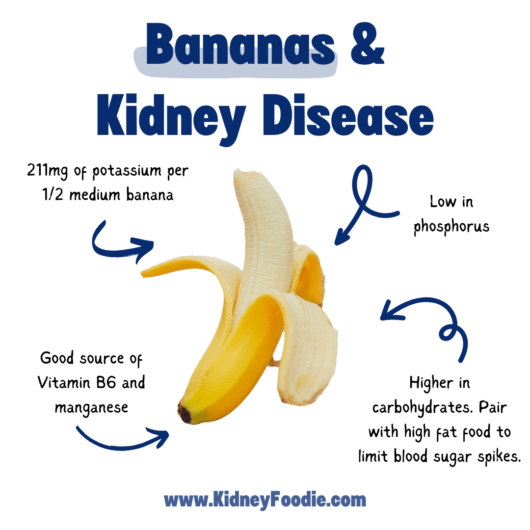
Are bananas high in phosphorus?
No. One half of a medium banana contains about 13mg of phosphorus. In general, fresh fruits and vegetables are all considered low phosphorus foods due to the low amount of phosphorus found naturally in these foods.
Additionally, the phosphorus found in bananas is natural and poorly absorbed by the body, so it is considered a low phosphorus food.
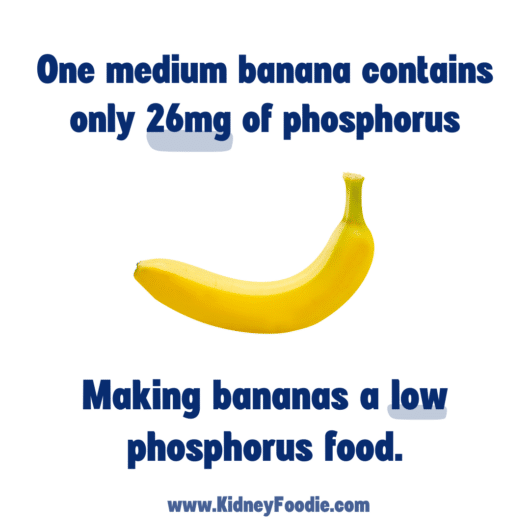
Are bananas high in potassium?
One half of a medium banana contains 211mg of potassium, which means that a full banana contains approximately 422mg of potassium. Bananas come in a variety of sizes. If potassium is a concern, be aware of what size bananas you are selecting.
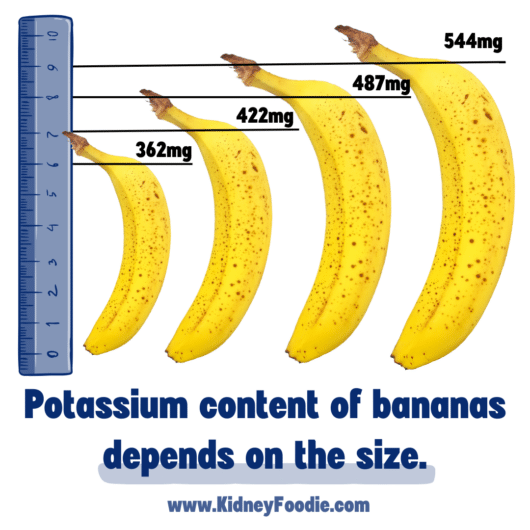
Many kidney professionals consider a vegetable to be high in potassium if it contains more than 200mg of potassium per serving, so bananas are considered a high potassium fruit. This does not mean that people with kidney disease cannot enjoy bananas.
Many people with kidney disease do not have problems with controlling their potassium levels and do not require a potassium restriction.
For those people who do have problems controlling their potassium levels, there are many other factors that could cause potassium levels to be out of range that are not related to the actual potassium content of the foods that they eat.
One problem with bananas is that they can be a bit constipating, especially as they get more ripe and the starches start to break down into more easily digestible sugars. Constipation can then lead to a lot of other problems – one of which is high potassium levels. So we definitely want to avoid constipation.
Another thing to consider with bananas and constipation is that bananas do not have a ton of fiber. Ideally, we want to be sure to get in plenty of high fiber fruits and vegetables each day, so bananas should not be the only fruit or vegetable in the diet.
Another reason to get a variety of fruits and vegetables is because different foods contain different nutrients. In order to get enough of each vitamin, mineral, and antioxidant, we need to be sure to eat different kinds of fruits and vegetables rather than the same one over and over again. At some point you may have heard the phrase “Eat the rainbow”, which is essentially just telling you to be sure to choose different colored fruits to get a balance of nutrients. The same advice applies to people with kidney disease.
If you truly do have a potassium restriction and love bananas, it may still be possible to include them in your day. A single medium banana has about 422mg of potassium in it. That is a lot for one food, but not a ton compared to what a single person eats in a day. We can fit that into a day even if you have a potassium restriction. It may mean balancing it out by choosing some lower potassium foods the rest of the day, but it is totally doable. Reach out to your dietitian to help you figure out how to fit it into your plan.
If you have kidney disease, you should not restrict your intake of fruits and vegetables because of potassium content unless instructed by your kidney dietitian or healthcare provider. Many people who have kidney disease do not need to restrict their intake of potassium. There are many other factors that could cause you to have high potassium levels that are not related to the food you eat. You can learn more about potassium and kidney disease through our low cost course.
What are the benefits of bananas?
- Bananas contain vitamins, fiber, and antioxidants. Antioxidants consumed through fruits and vegetables are considered to have protective effects against many chronic diseases.
- Research shows that a low intake of fruits and vegetables is associated with an increased risk of developing kidney failure in people with kidney disease (as well as those who don’t have kidney disease), so be sure to eat adequate fruits and vegetables each day.
- If you have trouble with constipation, eat your bananas when the peel still has a bit of green on it to help with the constipation.
Are bananas high in oxalates?
Bananas are considered a low oxalate food. (Source)
Oxalates are naturally occurring compounds found in many foods. When consumed, oxalates can bind with calcium in the body to form crystals, which can contribute to the formation of kidney stones in some individuals.
Kidney stones are hard deposits that form in the kidneys when there are high levels of certain substances, such as calcium, oxalate, and uric acid, in the urine. The most common type of kidney stone is calcium oxalate stones, which are formed when calcium and oxalate combine in the urine.
While oxalates are present in many foods, not everyone who consumes oxalates will develop kidney stones. Factors such as individual susceptibility, overall diet, and lifestyle choices play a role in kidney stone formation.
The highest oxalate fruits and vegetables are spinach, rhubarb, and swiss chard. However, it’s important to note that the mere presence of oxalates in food does not guarantee kidney stone formation. If you are not prone to developing kidney stones, then there is no reason to avoid foods that are high in oxalate.
Healthy ways to eat bananas
- Add them to smoothies to improve the flavor and creaminess of the smoothie (I put half a banana in my smoothie every morning!)
- Slice them up, top with your favorite nut butter, and freeze them for a delicious, refreshing treat that tastes more like dessert.
- Add them to baked goods like muffins
- Eat them fresh from the peel.
- Slice them up and add to kidney friendly yogurt or oatmeal.
High and Low Potassium Fruit and Vegetable Tool
Looking for more information on other kidney friendly fruits and vegetables? Check out our Fruit and Vegetable Potassium Tool.
